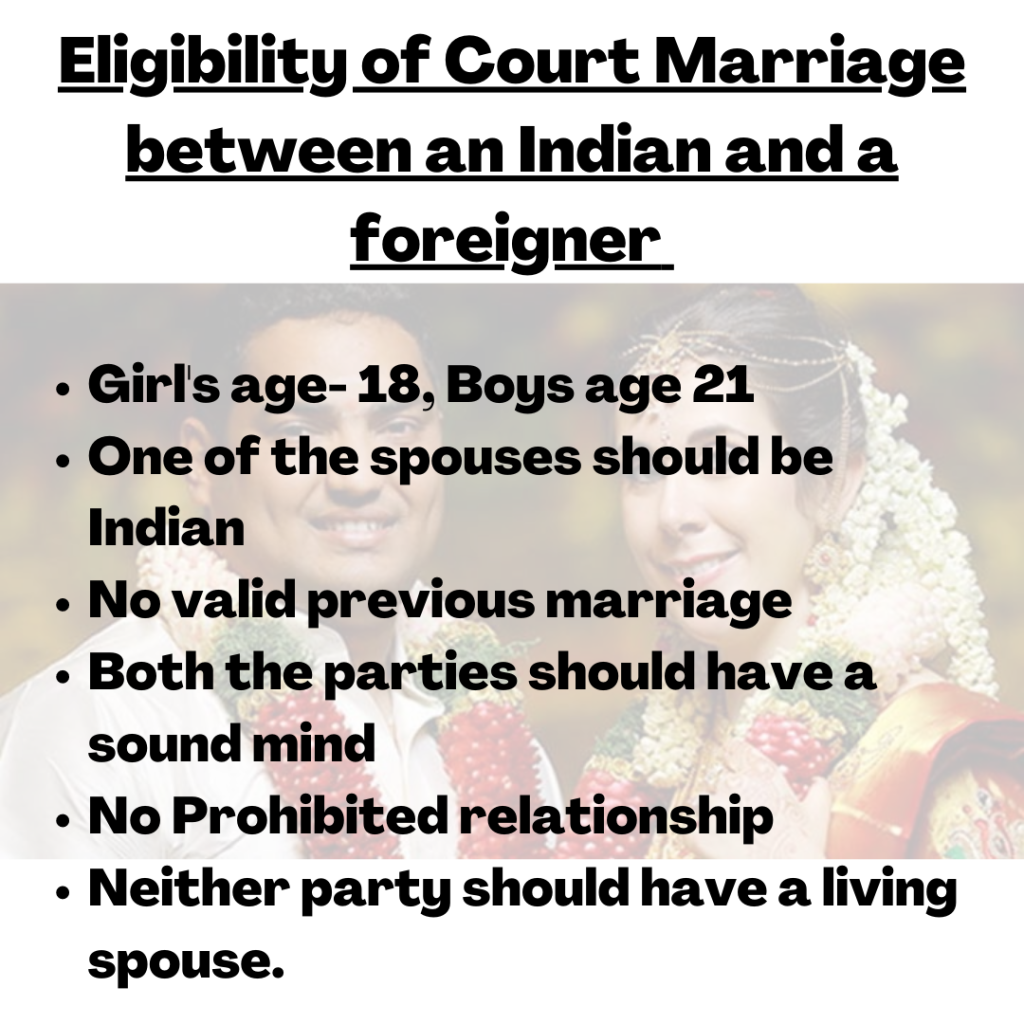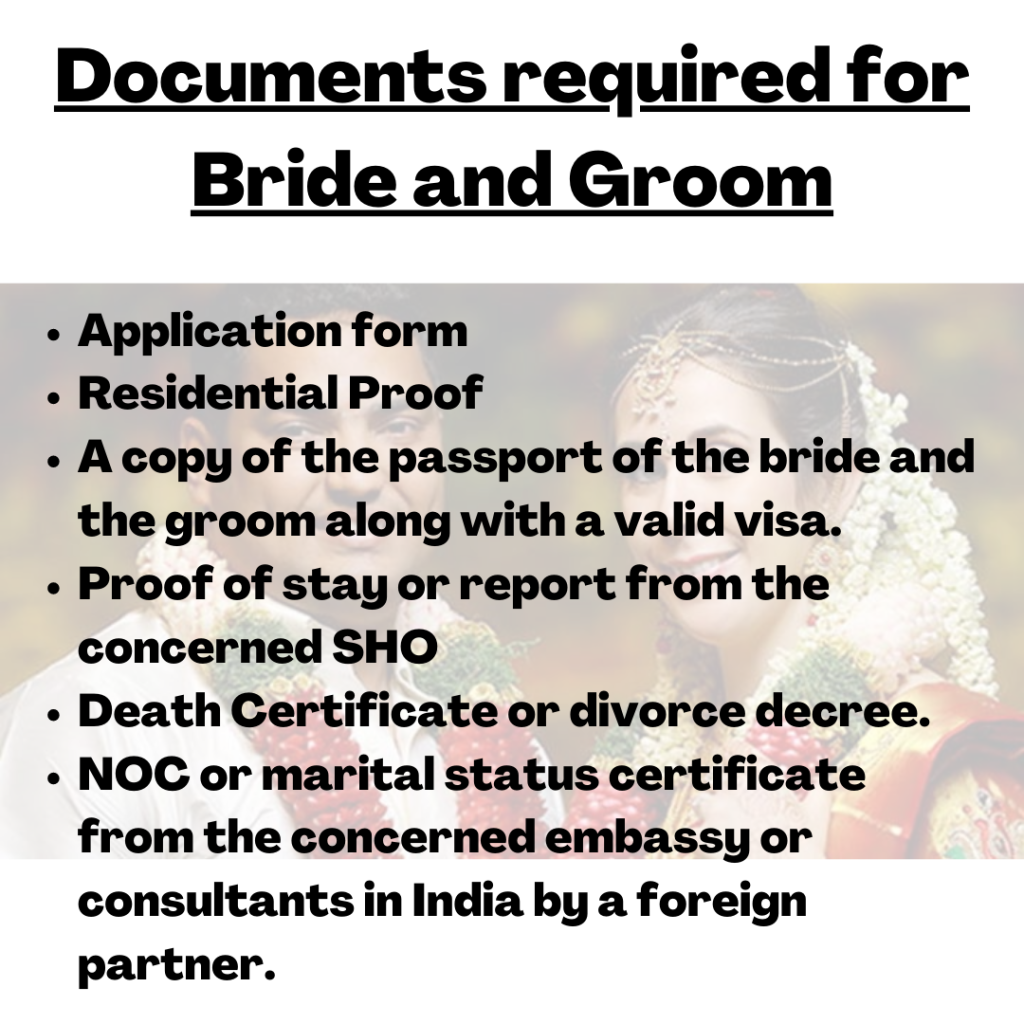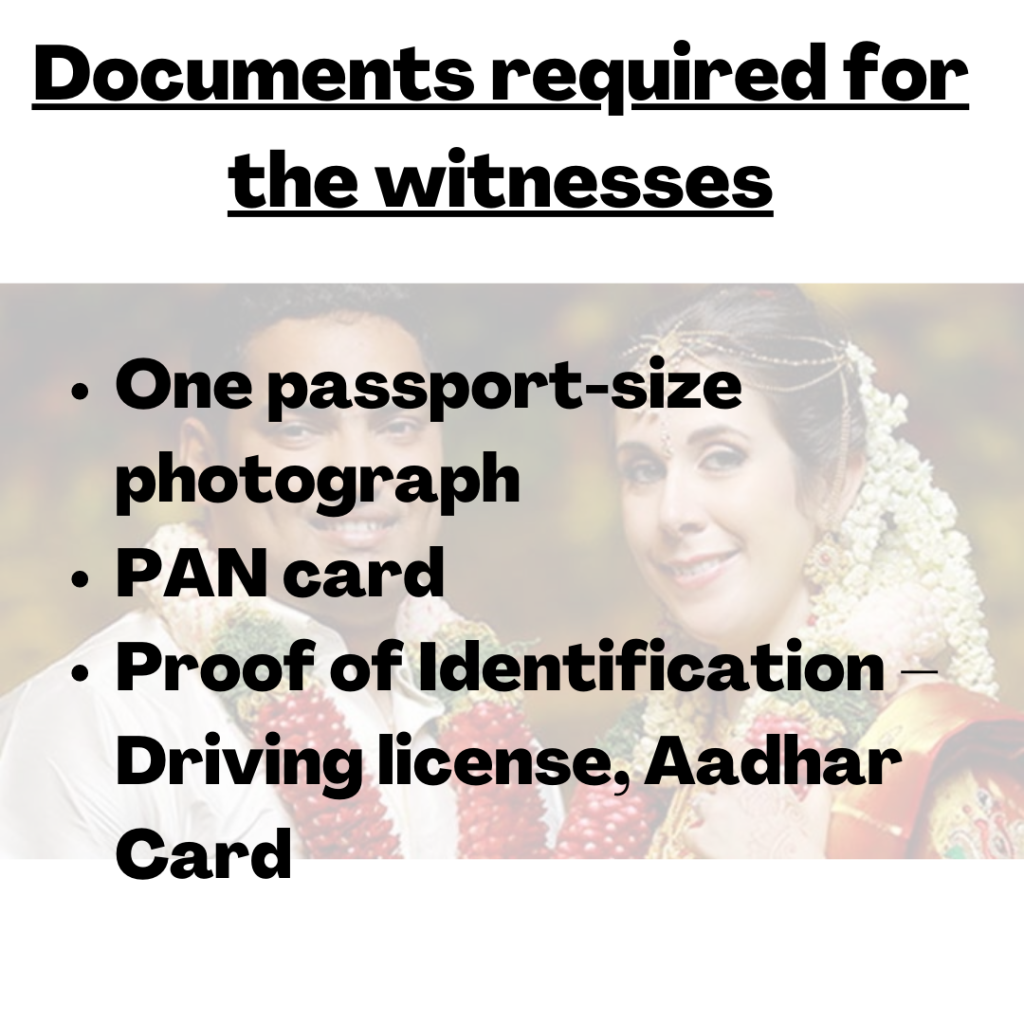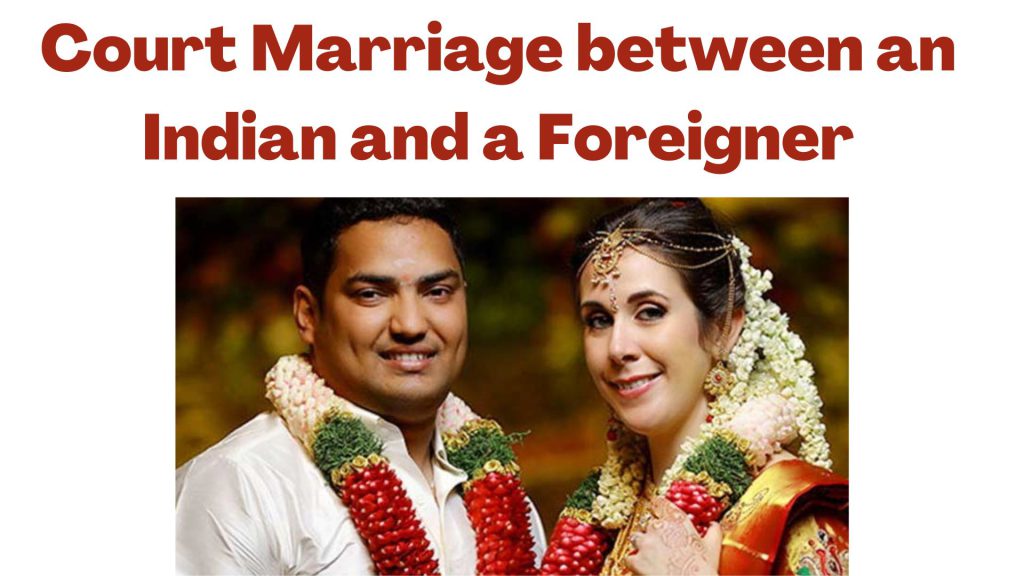Introduction
It is said that love sees no boundaries, it is indeed true. So if you are an Indian and want to start your family with a foreigner, Here is the article you need. This article will cover all the procedures that are required for the court marriage between an Indian and a foreigner.
Keep Reading! – Court Marriage Indian and Foreigner
A Marriage between parties one of whom at least is a citizen of India may be solemnized under the Special Marriage Act, 1954 in India before a marriage registrar in India or a marriage officer in a foreign county.
Suggested Reading : Court Marriage in India
Eligibility for a court marriage Indian and foreigner

Not everyone is eligible for a court marriage. Let’s check if you fall within the eligibility category or not.
- The Bride should be of 18 years of age and the groom must be of 21 years of age.
- One of the parties should be a citizen of India.
- Neither party should have a living spouse.
- Neither party should have a previous valid marriage.
- Both the parties should be of sound mind.
- The parties should not be within the degrees of prohibited relationship.
Documents required for the court marriage process
Here are the important documents that are required for the court marriage process between an Indian and a foreigner.

- Documents of the bride and the groom
- The application form is duly signed by both parties.
- Residential proof of both the bride and the groom.
- Age Proof of both the bride and the groom.
- A copy of the passport of the bride and the groom along with a valid visa.
- Documentary evidence regarding a stay at a district in India of one of the parties for more than 30 days (Proof of stay or report from the concerned SHO).
- Death Certificate of the previous spouse.
- Divorce decree from the previous spouse.
- NOC or marital status certificate from the concerned embassy or consultants in India by a foreign partner.

- Documents of the witnesses
- One passport-size photograph
- PAN card
- Proof of Identification – Driving license, Aadhar Card
Procedure
Here is the step-by-step procedure for the court marriage which is discussed below.
STEP-1
The first step is that the parties have to give a notice in writing to the marriage officer of the district in which at least one of the parties to the marriage has resided for a period of not less than 30 days immediately preceding the date on which such a notice is given. The notice shall state that the party has so resided.
STEP-2
The marriage registrar verifies all the documents at his office.
STEP-3
It is important that the law of other nations shall not conflict with the Indian Laws
STEP-4
The notice is then put up in the office of the marriage registrar and it is published inviting objections to marriage if any.
STEP-5
If no objection is raised, then on the expiry of the notice publishing period, the marriage may be solemnized.
STEP-6
During the solemnization of the marriage, 3 witnesses should be present.
STEP-7
This is the last step where the marriage registrar grants the marriage certificate to the couple.
Degree of prohibited relationships
Part-1
1. Mother
2. Father’s widow (step-mother)
3. Mother’s mother
4. Mother’s father’s widow (step grand-mother)
5. Mother’s mother’s mother
6. Mother’s mother’s father’s widow (step-great-grandmother)
7. Mother’s father’s mother
8. Mother’s father’s father’s widow (step-great-grandmother)
9. Father’s mother
10. Father’s father’s widow (step-grandmother)
11. Father’s mother’s mother
12. Father’s mother’s father’s widow (step-great-grandmother)
13. Father’s father’s mother
14. Father’s father’s father’s widow (step-great-grandmother)
15. Daughter
16. Son’s widow
17. Daughter’s daughter
18. Daughter’s son’s widow
19. Son’s daughter
20. Son’s son’s widow
21. Daughter’s daughter’s daughter
22. Daughter’s daughter’s son’s widow
23. Daughter’s son’s daughter
24. Daughter’s son’s son’s widow
25. Son’s daughter’s daughter
26. Son’s daughter’s son’s widow
27. Son’s son’s daughter
28. Son’s son’s son’s widow
29. Sister
30. Sister’s daughter
31. Brother’s daughter
32. Mother’s sister
33. Father’s sister
34. Father’s brother’s daughter
35. Father’s sister’s daughter
36. Mother’s sister’s-daughter
37. Mother’s brother’s daughter
Here, the word widow also means a divorced wife.
Part-2
1. Father
2. Mother’s husband (step-father)
3. Father’s father
4. Father’s mother’s husband (step-grandmother)
5. Father’s father’s father
6. Father’s father’s mother’s husband (step-great-grandfather)
7. Father’s mother’s father
8. Father’s mother’s mother’s husband (step-great-grandfather)
9. Mother’s father
10. Mother’s mother’s husband (step-grandfather)
11. Mother’s father’s father
12. Mother’s father’s mother’s husband (step-great-grandfather)
13. Mother’s mother’s father
14. Mother’s mother’s mother’s husband(step-great-grandfather)
15. Son
16. Daughter’s husband
17. Son’s son
18. Son’s daughter’s husband
19. Daughter’s son
20. Daughter’s daughter’s husband
21. Son’s son’s son
22. Son’s son’s daughter’s husband
23. Son’s daughter’s son
24. Son’s daughter’s daughter’s husband
25. Daughter’s son’s son
26. Daughter’s son’s daughter’s husband
27. Daughter’s daughter’s son
28. Daughter’s daughter’s daughter’s husband
29. Brother
30. Brother’s son
31. Sister’s son
32. Mother’s brother
33. Father’s brother
34. Father’s brother’s son
35. Father’s sister’s son
36. Mother’s sister’s son
37. Mother’s brother’s son
Here, the word husband also means a divorced husband.
Advantages of Court Marriage
Here are some advantages of court marriage.
- Court marriage is a much easier process than the traditional way
- The process of court marriage is much more economical, it saves a huge amount of money that is otherwise spent on rituals and ceremonies.
- The parties to the marriage get the option of solemnizing the marriage in any way they want.
- It ensures the consent of both parties. As both, the parties of marriage willingly sign the marriage documents. But There as in the marriage of ritual, the consent of the parties may or may not be free.
Hire a good matrimonial lawyer
Hiring a good matrimonial layer would be a good idea if you are proceeding to marry via court marriage.
- The parties must first consult a good matrimonial lawyer for filing the notice of the marriage.
- Your advocate will advise the parties on the rules and the applicable law.
- The advocate will decide the place of registration where the marriage can be registered.
- The advocate will ensure that the parties are eligible or not, and they will also ensure the free consent of both parties.
- the advocate will prepare all the necessary documents required for the registration processes.
- An advocate will set up a mutually convenient time for you, your partner, and the three witnesses to meet at the office of the marriage registrar to conduct a final check of documentation.
- In case of further claims and deliberations raised, an advocate will file an appeal on behalf of the parties and make the arguments.
Conclusion
I hope this article would have helped you in getting some clarity about the court marriage process between an Indian and a foreigner in India. Do not forget to share this piece of information with your friends who might need this.
